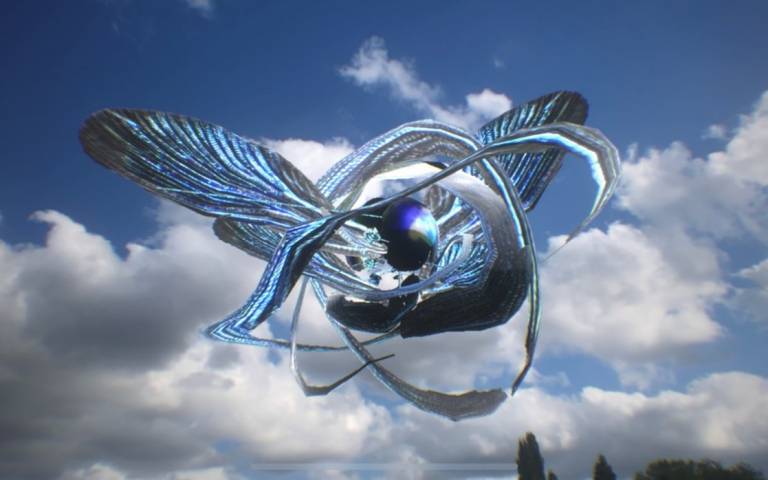UCL and Serpentine announce groundbreaking partnership across art, law and technology
16 June 2021
The long-term partnership, announced today, brings together Serpentine’s acclaimed Arts Technologies programme and UCL’s world-class research and innovation and will facilitate innovative exchanges across art, law, science and technology.

Researchers, artists, and curators from both institutions will work together closely on a series of cross-disciplinary projects focused on the following:
- Addressing the legal challenges that can arise in creative practices such as IP issues involved in art-making, games, and virtual reality. Through these projects, UCL and the Serpentine will combine their expertise to help artists enter contracts and collaborations on a fair and equitable footing, ensuring legal advice is accessible to all in the creative sector.
- Exploring the metaverse (persistent, shared, 3D virtual spaces) as a site for art and architectural practices, through an R&D partnership between UCL’s Bartlett School of Architecture and Serpentine. This will launch with a series of co-hosted events in Summer 2021 coinciding with the release of Serpentine’s Future Art Ecosystems Vol.2 and the annual Bartlett degree show. Further events are planned for September as part of The Bartlett Together Festival.
- The future of art education which will involve collaboration with the Slade School of Fine Art on a new Art & Tech degree at UCL East, UCL’s new campus in east London, as well as a public symposium on Art Futures.
In an increasingly tech-driven society, this partnership is designed to drive investment into leadership and thinking around the future of creative practice and policies. The rapidly emerging spaces of arts and technology require new systems and practices. Artistic engagements with advanced technologies are changing not only how artists work, but how they navigate new intellectual property (IP) models arising from technologies such as blockchain and Non-Fungible Tokens (NFTs).
A recent report by UCL Art Futures highlighted the challenges and opportunities that AI presents and the opportunities for artists to employ AI as a method of practice and as a topic for interrogation in their work.
Professor David Price, UCL Vice-Provost (Research, Innovation & Global Engagement), said: “The creative sector is of critical importance to the UK economy and, as the pandemic has reminded us, absolutely vital to our society and the richness of the overall human experience. Clearly it is a time of change and adaptation for the sector, but also one of exciting opportunities with the emergence of new immersive technologies and digital marketplaces. By forging new partnerships, such as this one, we can empower artists and creative practice and reach new audiences – ultimately enriching the lives of thousands of people in London and beyond.”
Bettina Korek, CEO and Hans Ulrich Obrist, Artistic Director, Serpentine said: “In order to empower artists to drive change on the issues and systems shaping our society, Serpentine increasingly focuses our attention on ecology, technology and community. It is through strong collaborative partnerships like this one with UCL that our Arts Technologies programme continues to innovate, grow, and spearhead new models for sharing resources and research that benefit with the wider cultural sector as a whole.”
Dr Anna Donovan, founder of UCL Art Futures and lecturer at UCL Laws, said: “The emergence of new technologies gives rise to an exciting period of opportunity, collaboration and innovation for the creative industries. The law plays an important role in facilitating this innovation by ensuring that collaborations are built on agreements that are fair, equitable and properly reflect the legal issues that these novel forms of creative practice can raise. This important partnership between UCL and Serpentine provides a particularly timely and unique pillar of support to the sector. Combining our expertise, we can help to ensure that artists not only have access to legal information but that the appropriate legal tools exist, which reflect and protect the new types of artistic practices that are emerging.”
Kieren Reed, Slade Director and founder of UCL Art Futures, said: “As a research intensive department, the Slade has supported the development of generations of artists at different points in their career. This defining partnership with Serpentine aims to enable new research into technological transformations of cultures and societies, and promote public engagement across future art ecosystems. The Slade's new Art & Tech course will prepare artists to make art that uses and critically engages with advanced technologies. This partnership with Serpentine will broaden the ambition and public outreach of our shared research, by combining our different strengths to question and influence the future of art.”
Tonya Nelson, Area Director, London, Arts Council England, said: “New technologies offer up a whole host of opportunities for creative innovation. As a result, the latest systems, practices and laws need to be navigated by researchers, artists and curators. The important partnership between UCL and Serpentine will provide a space for collaboration, ambitious research and learning. In turn, it will help this ongoing artistic exploration thrive.”
Image: Jakob Kudsk Steensen, The Deep Listener, 2019. AR Screenshot. Courtesy of the artist.
Find out more
- Dr Anna Donovan’s academic profile
- UCL Art Futures
- UCL Laws
- Kieren Reed’s academic profile
- Slade School of Fine Art at UCL
- The Bartlett, UCL Faculty of the Built Environment
- Office of the Vice-Provost (Research, Innovation & Global Engagement)
- Serpentine
- Serpentine’s R&D Labs
- Arts Council England
Media contact
Mark Greaves
T: +44 (0)7990 675947
E: m.greaves [at] ucl.ac.uk
 Close
Close

